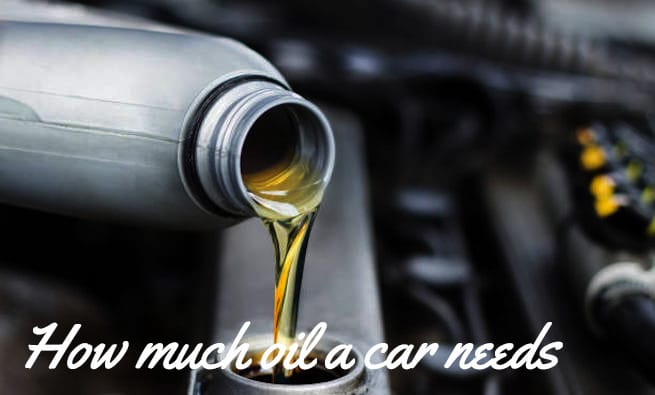How Much Oil Does My Car Need? [5 or 6 Quarts of Oil & Cost]
Engine motor oils are often considered the lifeblood of your engine. Without engine oil, your engine would quickly overheat, your pistons and crankshaft would seize, and your engine would be ruined.
Too much oil can harm your engine, and too little can also harm the engine. So, keep reading to find out how much oil does my car need.
Always check your owner’s manual or check with your mechanic for the amount and type of oil recommended for your vehicle. Engine oil, as well as the oil filter, should be changed regularly.
The owner’s manual provides a recommended maintenance schedule for oil changes, tells you how much does my car need and general servicing recommendations. The frequency of oil changes also depends on the type of oil used and the type of driving- city or highway.
Oil Amount By Engine Size

Every engine has a specified oil capacity. Not all oil is drained from the engine when you complete an oil change. For example, oil is left in the oil filter if it is not also changed at the same time. Small amounts of oil can also be found in various nooks and crannies of car engines.
If you are doing an oil change yourself, check the manual, replace the oil as specified. Vehicle specifications vary by engine size and manufacturer. Check the size of the engine and add oil as needed. Check your dipstick for the correct level. Run the engine briefly and check the dipstick again to verify.
4 cylinder engine
Typically, a 4cylinder engine uses five quarts of oil. However, as mentioned previously, the amount used depends on whether you change the oil filter at the same time. Always check your owner’s vehicle manufacturers manual for the correct amount of oil to use inside the engine.
6 cylinder engine
A 6 cylinder or v6 engine is larger and uses more oil. Most 6 cylinder engines require 6 quarts of oil depending on design and manufacturer. Start by checking your vehicle owners manual and assess whether the oil filter will be changed at the same time.
8 cylinder engine
Eight cylinder engines vary in size and, as a result, can require from five to eight quarts of oil. It is imperative not to overfill the engine with oil. Check the owner’s manual or look up your engine’s specifications on the manufacturer’s website for online manufacturers’ recommendation.
What Are The Type of Oil For Your Car?
Before you decide on what kind of oil for your vehicle’s engine, you should consider a few things. Oil is specified with two numbers, e.g., 5W30. These numbers refer to viscosity levels. The first is the viscosity at zero degrees Fahrenheit and the second is at 212 degrees Fahrenheit. A low viscosity, e.g., 5, makes it easier to start your engine in colder temperatures. The second factor is whether you use conventional or synthetic motor oils.
Conventional oil
Conventional oils are used in most vehicles and work fine. One drawback is that the oil should be changed more often than synthetic oils. Check your oil level often. If your oil is turning black, you probably should change the oil. Always check your owner’s manual for the required frequency of oil changes when using conventional motor oil.
Synthetic oil
Synthetic blend oils tend to last longer, and your car can be driven further between oil changes. These oils also contain additives to promote better engine health. Oil flows better at high temperatures, additives assist in removing deposits, and conditioners to assist in maintaining the flexibility of engine seals.
Check your owner’s manual for the recommended frequency of oil changes when using synthetic oil. Although there are plenty of options in the oil industry, we recommend our readers to try to upgrade to a platinum full synthetic motor oil if possible.
Common Symptoms Why My Engine Needs Oil
There are tell-tale signs that drivers should always pay attention to. If your engine is low on oil, serious problems and major repairs could occur.
- Engine oil light illuminates – indicates your engine needs oil. Check your oil level immediately and take corrective action.
- If you have an oil gauge on the dash, a low oil pressure reading could also indicate low oil levels. Add oil as needed.
- Your vehicle engine may begin to run roughly as oil levels decline. Various components are not being lubricated properly and could cause permanent damage.
- Bad oil control valve is also related to low oil levels.
Check engine oil levels regularly and add oil as needed. Check if your engine needs an oil change. Change the oil at regular intervals and follow scheduled maintenance as specified by the manufacturer.
There are many questions readers have about the type of oil to use, overfilling, and underfilling with oil, and what causes engine oil to drop gradually. The following are frequently asked questions.
Overfilling an engine with oil can damage the engine. Higher oil pressure may result in blown gaskets, blue smoke from the exhaust pipe, and oil leaks on the ground under your engine. If your engine oil is only slightly above the max sign on the oil measuring stick, you should be ok, however higher levels of excess oil could cause problems. You may need to drain some oil from the engine to bring it back to proper levels.
Under filling an engine with oil can lead to catastrophic results for your engine. If it is just a bit low on oil, your car engine may be fine. If there is no reading on the dipstick, your oil level is very low, which means that the engine components and moving parts are not receiving sufficient lubrication.
Significant engine wear and tear may be the result. If your engine is leaking oil or has a history of burning oil, or not running smoothly, check the oil level every 500 miles or so to ensure there is sufficient oil.
The oil in your car engine can be low for several reasons. Older cars can suffer from small oil leaks, which gradually depletes the oil in the engine oil. Look for signs of little oil drips under the car or around the engine. If you can smell burning oil, the leaking oil is landing on a hot surface.
Older engines also burn oil due to worn piston rings. If there is blue smoke appearing at the exhaust, chances are your engine is burning oil. Form a habit of checking the oil level often and top up as needed. If the oil level is low, most likely, there’s a leak that needs to be addressed.
Most engine oil contains as much as 30% additives right off the shelf unless you are using some of the less expensive brands. Your car engine is designed to work just fine with a good quality engine oil that is changed periodically along with the oil filter. There are a variety of engine oil additives.
For example, viscosity modifiers, anti-wear additives, corrosion and rust inhibitors, detergents, and dispersants. Consider the age and the mileage of your engine. Older engines may benefit from the addition of special additives.
Tip: Ask your mechanic to check the transmission fluids when you take your vehicle to regular maintenance. Vehicles with high mileage, older vehicles, engines with the beginning signs of wear and vehicles with decreasing performance may benefit from the addition of additives. The first step is always to have the car’s oil and filter changed at regular intervals.
Try not to overfill the engine oil as you add additives. This can cause more damage. There are a variety of additives on the market. Choose the one that best meets the condition and symptoms your engine is displaying.
Having good engine lubrication will result in a better overall performance. Car owners need to keep updating their lubrication system as often as the manufacturer recommends. Be in a lookout for air bubbles in your cooling system.
Auto Engine Oil? – F.A.Q.

What happens if I overfill the oil in the engine?
What happens if I under-fill the oil in the engine?
Why is the oil level low in my car?
Should I add any special additives?
Does it Improve my engine performance?
Vehicle Oil Summary
Change your engine oil and filter at regular intervals as recommended by the manufacturer’s maintenance schedule.
While synthetic oil is typically more expensive, synthetic oil last longer and is considered better for engine performance and longevity.
Overfilling an engine with oil can cause harm to internal parts, while too little engine oil can also cause catastrophic damage to the engine. Oil leaks and blue smoke from the exhaust are signs to watch for.
Check the engine motor oil level often if either of these conditions exists. As engines age, engine oil additives can be considered to improve performance and protect the engine from further wear and tear.
Now you understand that the amount of motor oil will depend on the type of engine. A larger engine requires more oil than a smaller one.
Last Updated on: July 14, 2022

